Innovation should not be a separate discipline but rather an approach that is an integral part of all subjects.
There is no doubt that if you support learning processes that are modern, efficient and which invite students to be creative in their daily work – this will help the innovation perspective.
But what is it then specifically that distinguishes ”normal”, good teaching learning methods from learning with an eye to innovation?
In my opinion the crucial factor would be that in learning for innovation, the world is presented as something which is under continuous change – a development each of us has the possibility to affect.
We live in a time in which we increasingly will be expected to act and develop in relation to the contexts we are part of. Thus, we should not merely accept the facts and circumstances that we are presented with as static, but rather see them as stages of a continued process.
This requires that one understands the history that preceded the present, and that one understands the forces that are driving development.
It implies that one decides if a situation is satisfactory and good, or if it should be changed.
And it requires that one feels relatively at ease dealing with uncertainty and change.
This all means that teaching innovation would have 5 distinct assumptions integrated:
- Understanding the world as being under continuous change
- Understanding that each of us has the possibility and is under demand to participate in the further development
- A critical, assessing approach to the existing conditions
- Knowledge of the tools that are necessary in order to act in relation to the development
- A physical environment that can be changed and which invites its users to create and experiment
Tuesday, December 19, 2006
Friday, December 15, 2006
Mutating memes
Saturday, November 04, 2006
Dawkins; spirit without religion?
More Dawkins, transcribed from 44 minutes into the Point of inquiry interview.
I find this passage fascinating. To me it shows the intellectual honesty of Dawkins and the vulnerability that comes with it. After lambasting religions and faith based world views, he never the less points at this ”spirituality” at the basis of everything.
It sounds schizophrenic, but I entirely understand him. I am awed by the beauty and sophistication of it all, but I have a hard time with religions.
”There are those that believe in evolution, but still believe in the doctrines of some particular religion such as Christianity. They believe in the redemption by the crucifixion, the resurrection and so on... which are sort of miraculous beliefs.
But there are others who are often physicists or other scientists who don’t have any belief in those things, but none the less believe in some form of intelligence, some vast cosmic intelligence at the basis of the whole of the universe. I do have a lot more respect for them – for one thing they are a lot brighter than I am and one has to respect that – but I would be prepared to argue with them - but I do think that it is very different from belief in some particular religion with miracles, with prayer and with forgiveness of sins and all the things that go with, say, Christianity or Islam or Judaism.
It’s very easy to listen to a physicist who is making a very sophisticated case for some spirit at the deep base of the universe and to think ”oh well, he is just talking about Christianity – No, he is NOT talking about Christianity, he is talking about something far grander, far more profound, something that physicists maybe in a thousand years time may give a naturalistic explanation to.
I think it is very pernicious to confuse that sort of spirituality which sounds vaguely religious with the particular beliefs that we associate with named religions of history and persisting into today".
I find this passage fascinating. To me it shows the intellectual honesty of Dawkins and the vulnerability that comes with it. After lambasting religions and faith based world views, he never the less points at this ”spirituality” at the basis of everything.
It sounds schizophrenic, but I entirely understand him. I am awed by the beauty and sophistication of it all, but I have a hard time with religions.
”There are those that believe in evolution, but still believe in the doctrines of some particular religion such as Christianity. They believe in the redemption by the crucifixion, the resurrection and so on... which are sort of miraculous beliefs.
But there are others who are often physicists or other scientists who don’t have any belief in those things, but none the less believe in some form of intelligence, some vast cosmic intelligence at the basis of the whole of the universe. I do have a lot more respect for them – for one thing they are a lot brighter than I am and one has to respect that – but I would be prepared to argue with them - but I do think that it is very different from belief in some particular religion with miracles, with prayer and with forgiveness of sins and all the things that go with, say, Christianity or Islam or Judaism.
It’s very easy to listen to a physicist who is making a very sophisticated case for some spirit at the deep base of the universe and to think ”oh well, he is just talking about Christianity – No, he is NOT talking about Christianity, he is talking about something far grander, far more profound, something that physicists maybe in a thousand years time may give a naturalistic explanation to.
I think it is very pernicious to confuse that sort of spirituality which sounds vaguely religious with the particular beliefs that we associate with named religions of history and persisting into today".
Friday, November 03, 2006
Prefab housing factory
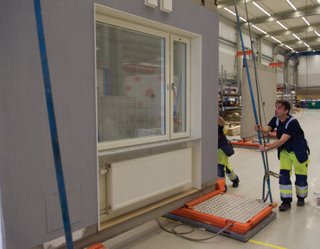
Swedish contractor NCC has created a quite revolutionary factory for producing prefab houses. Usually 90% of construction is done at the building site. With this concept, 90% of construction is done in the controlled and automated factory environment. The assembly on site is done underneath a giant tent, so no water damage etc.
NCC claims that they have cut production time for housing in half.
There's a 7 minute film about the concept at their website.
Dawkin's back
There's a number of podcast out there with excellent speeches and interviews with Richard Dawkins talking about his latest book "The God delusion".
- A twenty minute speech at TED talks
- An hour long interview on point of inquiry
He speeks eloquently on the dangers of blindly accepting religius dogma and explanations based on faith. Very refreshing.
I transcribed this snippet from his recent speech Poptech - which is not online yet:
Science has taught us many things against our intuition. Appearantly solid things like crystals and rocks are almost entirely empty space – the familiar illustration is a fly in the middle of a sports stadium. The nucleus is the fly in the middle of the sports stadium and the next nucleus is the next fly in the middle of the next sports stadium.
The hardest, densest rock is ”really” almost entirely empty space, broken only by tiny particles so widely spaced they shouldn’t count. Why then do rocks feel hard and solid and impenetrable. Well, as an evolutionary biologist I’d say something like this: Our brain has evolved to help us survive within the orders of magnitude of size and speed at which our body normally operates. We never evolved to navigate in the world of atoms – if we had, our brains would probably percieve rocks as full of empty space.
Rocks feel hard and impenetrable to our hands because our hands themselves can’t penetrate them. It’s therefore useful to our brians to construct notions like solidity and impenetrability.
Moving to the other end of the scale, our ancestors never had to move through the cosmos at anything like the speed of light, if they had our brains would be much better equipped to deal with Einsteins ideas of relativity.
I give the name middleworld to the medium scale environment, the things moving at medium speeds , in which we have evolved, in which our brains have evolved to understand and take action.
- A twenty minute speech at TED talks
- An hour long interview on point of inquiry
He speeks eloquently on the dangers of blindly accepting religius dogma and explanations based on faith. Very refreshing.
I transcribed this snippet from his recent speech Poptech - which is not online yet:
Science has taught us many things against our intuition. Appearantly solid things like crystals and rocks are almost entirely empty space – the familiar illustration is a fly in the middle of a sports stadium. The nucleus is the fly in the middle of the sports stadium and the next nucleus is the next fly in the middle of the next sports stadium.
The hardest, densest rock is ”really” almost entirely empty space, broken only by tiny particles so widely spaced they shouldn’t count. Why then do rocks feel hard and solid and impenetrable. Well, as an evolutionary biologist I’d say something like this: Our brain has evolved to help us survive within the orders of magnitude of size and speed at which our body normally operates. We never evolved to navigate in the world of atoms – if we had, our brains would probably percieve rocks as full of empty space.
Rocks feel hard and impenetrable to our hands because our hands themselves can’t penetrate them. It’s therefore useful to our brians to construct notions like solidity and impenetrability.
Moving to the other end of the scale, our ancestors never had to move through the cosmos at anything like the speed of light, if they had our brains would be much better equipped to deal with Einsteins ideas of relativity.
I give the name middleworld to the medium scale environment, the things moving at medium speeds , in which we have evolved, in which our brains have evolved to understand and take action.
Friday, October 27, 2006
A long wait for a good beer - Guinness evolution ad

Just saw this amazing ad for Guinness, three guys in a pub that suddenly get thrown backward in evolution, 3 billion years to the point where they lizards drinking foul water at some pond. Sometimes ads are so great.
Monday, October 23, 2006
The singularity summit as podcasts
So much good stuff, so little time.
There’s a number of very good talks available as podcasts from the Singularity Summit at Stanford – back in may.
A little snippet: In his speech Cory Doctorow has a good description of the fundamental problem with controlling the network with heavy-handed Digital rights management:
All complex systems have parasites and you can’t solve parasites by rendering the system simple. Solving the parasites by rendering the system simple renders the system not powerful enough to not even bother with.
There’s a number of very good talks available as podcasts from the Singularity Summit at Stanford – back in may.
A little snippet: In his speech Cory Doctorow has a good description of the fundamental problem with controlling the network with heavy-handed Digital rights management:
All complex systems have parasites and you can’t solve parasites by rendering the system simple. Solving the parasites by rendering the system simple renders the system not powerful enough to not even bother with.
Mega cities on display in Venice

The biennale on architecture in Venice is well worth a visit – you should reserve two days for it, there’s a lot to see. It’s hard work, but luckily there’s all of that wonderful Italian coffee to pick you up.
It closes on november 18th.
The theme this time is Mega cities, and the main exhibition looks at 16 major cities: Caracas, Cairo, Mexico City, Cairo, Berlin, Shanghai, Istanbul and Los Angeles are among them.
Lots of good analysis, breathtaking multimedia, amazing photos and interesting facts. Such as:
There’s one square meter of free space pr. Inhabitant in Cairo.
In 2050 8 billion people will be living in cities - 3/4 of the worlds population, as opposed to just over half today.
The worlds largest city currently is the greater Tokyo metropolitan area with 34 mio. Inhabitants. By 2050 Mumbai is expected to be the largest. It’s currently 18 mio. But will likely be over 40 mio. Then.
In Los Angeles 80% of all transportation is in cars, In Tokyo 80% of transportation uses trains and buses.
The typical daily commuting time in Sao Paolo, Brasil is 4-5 hours.
Half of all cement in the world is used in China. Shanghai alone added 2700 skyscrapers in the past ten years, increasing the number of hi-rises tenfold.
60% of Mexico Cities inhabitants are squatters. The rates for ”informal” occupancy is similar in many third mega-cities.
The impression I got away with was that of to very strong, opposing forces, top-down and bottom-up. One is city planning and architecture on an absolutely massive, soviet style scale. The exhibition shows any number of very large projects for brand new cities with hundreds of thousands of inhabitants – particularly for Asia.
The other force is the flood of poor people simply moving to the city, putting up their shacks where it’s possible. Seen from above, it looks like a sea of corrugated tin roofs and muddy roads swallowing the old, official cities.
The Venezuelan pavilion is about the slums of Caracas. On a wall-size sign it’s states something like: These people have no use for architects. This sort of city does not look like someone intended. But perhaps, the solutions that the people in the slums find to solve the extreme pressure on resources could be used by all of us.
For old times sake I did a radio-report for Radio Denmarks Orientering.
It’s in Danish, though. You can hear it here.
Sunday, October 22, 2006
Craig Venter at Poptech

I missed Poptech this year, but very generously the amazing Poptech team streamed the whole conference - so I’ve kinda been there, at least virtually.
The one talk I was really looking forward to was Craig Venter – of decoding the human genome fame. He came on as the last speaker. He’s almost scary in his laser like determination and belief in what he’s doing, but I get this feeling that we’d better listen. He’s working on “synthetic biology”, his project is to create new life from the bottom up, bacteria which can be tailored to do Really Usefull Stuff – like eating CO2 and turning it into energy for us to use.
It’s a wonderful prospect, but I can see a million things going wrong before we can relax about large scale use of synthetic bacteria.
The following passage of Venter’s speech gets into some of the details. Sounds to me like he’s spelling out the future - although I’m not sure that I’ve gotten all the spelling right:
No cells’ genome has yet been even remotely synthesized and even genome replacement has not yet been demonstrated. So we’re early on, but we think there’s tremendous use for this key technology as we go forward.
This audience clearly knows about energy demand and the potential to develop new fuels. My view is coming a little bit from a different side in terms of what we are doing to the environment; We’re adding 3,5 billion tons of CO2 to the atmosphere each year, we can not afford to ignore any technology that offers a solution.
We’ve designed, on paper, organisms that can take that CO2 back from the atmosphere and fix the CO2 into cellular proteins, sugars, biopolymers etc. Just recently Dupont has opened a plant in Tennessee that has silos, 4 of them, about the size of this room, for producing propanediol from sugar, that goes into their new ceronapolymer that’s going to be used for stain free carpets and clothing - all derived from modifying the genome of a bacteria. They are starting with sugar, but we can go back further, to CO2.
We have metabolic pathways that can take carbon monoxide out of the air, split water with that, producing hydrogen and oxygen. We can go from methane to produce hydrogen or other fuels. We have a team working on modifying photosynthesis to go straight from sunlight into hydrogen production without any other energy being added - and we and others have been working on modifying cells to produce burnable fuels directly.
So cellulasis, or enzymes that break down the complex sugars that form plants and trees – everybody knows that termites can eat wood but in fact termites can not eat wood, they have bacteria in their guts, the cellulasis, that break down the cellulose into simple sugars.
The goal is to convert some of agriculture where we can capture back some of this carbon in a recyclable fashion. People are starting with ethanol but there is no reason why in a few years time we can’t go right from cellulose through a bacteria to make butane, propane, even octane directly.
Now all of a sudden, in stead of taking carbon from the ground, burning it and putting it in the atmosphere we can recycle it through the process of photosynthesis. We’re looking at a wide variety of plants as feed stocks, going into producing chemicals as Dupont is doing, for nutraceuticals and most importantly into energy - in terms of what we are rapidly doing to this planet.
I’m the least worried about disease, whether it’s manmade or new emerging infections affecting humanity. In the long term. if we destroy our spaceship, which we are in the process of doing, disease will not matter.
Tuesday, September 19, 2006
I’m so fed up with ”innovation”
I write a bi-weekly column for the Danish edition of computerworld. Here's a sample in translation:
It’s hard to have a civilized discussion these days without using the term ”innovation”. We all know the refrain: We are living in different times, and in the future we will all have to be creative for a living.
...I think we’ve all pretty much understood that by now.
The problem with the word ”innovation” is that it suggests that we’re all going to run around spewing great ideas 8 hours a day. While in fact it’s a much broader set of competences that we need.
In primary schools one uses the term ”litteracies”, to describe the basic skills that are necessary in order to get by in society. In Denmark the law emphasizes 5 litteracies: reading, writing, math, English as second language, and basic IT skills. If you lack one or more of these, you will experience that the doors to further learning are shut.
What’s considered basic litteracies obviously changes as the conditions in society change. As we shift from the industrial society to a networked society we will need to acquire a number of new, basic competences to supplement the old litteracies. I would argue that it’s really this new set of competencies that’s being called for, when politicians, business leaders and columnists demand that we learn to be ”innovative”.
I realize that the following will sound pretty theoretical, but, put briefly, I believe that the competences we need are about understanding the new game rules in a globally connected, complex, dynamic system.
The world is being ever tighter coupled and developments in completely different areas increasingly affect eachother. Furthermore, changes in the global system are accellerating, as each new technical development makes us capable of taking the next step forward even faster.
This makes it crucial to have mechanisms like evolution, non-linearity, feedback, self-organization and ecology completely internalized in the way we assess situations and act in accordance with the realities of today and the coming years. One needs to be familiar with these mechanisms in order to understand such phenomena as the internet, international politics, a market place or how a living system – like our own body – functions.
Paradoxically, we are experiencing an increasing individualization concurently with the growing connectivity and interdependence. Ever more of us are reaching a level of education and wealth at which we can start demanding a high degree of individual freedom and service. However, this freedom implies a growing personal responsibility. All of us must learn to be pro-active and manage a personal strategy of development – for instance by maintaining our level of knowledge and our health.
The world has become interactive. In contrast to the dominating mass culture of industrialism we are now increasing co-creators – and thus co-responsible – for the relevance of our work and for the shaping of the products and service we use. We can’t get by like in the industrial age, relying on top-down hierachies in which most people just did what they were told to do.
We need a new approach which is compatible with the new conditions of this new age. At a fundamental level it’s about seeing change as the natural state of affairs. Increasingly, we will produce and consume processes, that are continuously adjusted to fit the users changing contexts at a speed that approaches realtime.
Thus, we need to get accustomed and feel at ease thinking in terms of probabilities and adhoc solutions rather than certainties and stability. In order to participate in the global interaction we must be open minded and explorative, willing to share experiences, able to communicate and receptive to input from others.
... Oh, and of course we also need to be creative in order to find new solutions and to use our knowledge in ever changing contexts. Innovation is crucial – but in my understanding it only covers a fraction of an entirely new mindset that we need to make the basis of our educations.
I wish I could innovate a better word for it.
It’s hard to have a civilized discussion these days without using the term ”innovation”. We all know the refrain: We are living in different times, and in the future we will all have to be creative for a living.
...I think we’ve all pretty much understood that by now.
The problem with the word ”innovation” is that it suggests that we’re all going to run around spewing great ideas 8 hours a day. While in fact it’s a much broader set of competences that we need.
In primary schools one uses the term ”litteracies”, to describe the basic skills that are necessary in order to get by in society. In Denmark the law emphasizes 5 litteracies: reading, writing, math, English as second language, and basic IT skills. If you lack one or more of these, you will experience that the doors to further learning are shut.
What’s considered basic litteracies obviously changes as the conditions in society change. As we shift from the industrial society to a networked society we will need to acquire a number of new, basic competences to supplement the old litteracies. I would argue that it’s really this new set of competencies that’s being called for, when politicians, business leaders and columnists demand that we learn to be ”innovative”.
I realize that the following will sound pretty theoretical, but, put briefly, I believe that the competences we need are about understanding the new game rules in a globally connected, complex, dynamic system.
The world is being ever tighter coupled and developments in completely different areas increasingly affect eachother. Furthermore, changes in the global system are accellerating, as each new technical development makes us capable of taking the next step forward even faster.
This makes it crucial to have mechanisms like evolution, non-linearity, feedback, self-organization and ecology completely internalized in the way we assess situations and act in accordance with the realities of today and the coming years. One needs to be familiar with these mechanisms in order to understand such phenomena as the internet, international politics, a market place or how a living system – like our own body – functions.
Paradoxically, we are experiencing an increasing individualization concurently with the growing connectivity and interdependence. Ever more of us are reaching a level of education and wealth at which we can start demanding a high degree of individual freedom and service. However, this freedom implies a growing personal responsibility. All of us must learn to be pro-active and manage a personal strategy of development – for instance by maintaining our level of knowledge and our health.
The world has become interactive. In contrast to the dominating mass culture of industrialism we are now increasing co-creators – and thus co-responsible – for the relevance of our work and for the shaping of the products and service we use. We can’t get by like in the industrial age, relying on top-down hierachies in which most people just did what they were told to do.
We need a new approach which is compatible with the new conditions of this new age. At a fundamental level it’s about seeing change as the natural state of affairs. Increasingly, we will produce and consume processes, that are continuously adjusted to fit the users changing contexts at a speed that approaches realtime.
Thus, we need to get accustomed and feel at ease thinking in terms of probabilities and adhoc solutions rather than certainties and stability. In order to participate in the global interaction we must be open minded and explorative, willing to share experiences, able to communicate and receptive to input from others.
... Oh, and of course we also need to be creative in order to find new solutions and to use our knowledge in ever changing contexts. Innovation is crucial – but in my understanding it only covers a fraction of an entirely new mindset that we need to make the basis of our educations.
I wish I could innovate a better word for it.
Wednesday, August 23, 2006
Terraforming in Holland


...while I’m at it: Here’s another amazing landscape. It’s just north of Rotterdam in the Netherlands. The area is known as Glaslaan; the glass region.
What you see are greenhouse, massive stretches of enormous greenhouses. I spent a whole day photographing the surrealism of the place a few years back.

That giant sucking sound

I am working on a presentation about water and I was looking for images that would illustrate how much water is used for irrigation – often in areas that basically are not suited for intensive agriculture at all.
(fact: 70% of global water consumption is for irrigation).
I heard that Garden City in Kansas was a place that used pivot irrigation a lot, and sure enough: if you have a look from the Google Earth satellite, you see this massive example of terraforming.
I can't help wondering what the view will be in a few decades.

Monday, August 21, 2006
Freedom and responsibility
Come to think of it it’s actually very simple:
Freedom and responsibility are intertwined in the sense that the more freedom you have in choosing your actions, the more those actions will be your responsibility.
Freedom and responsibility are intertwined in the sense that the more freedom you have in choosing your actions, the more those actions will be your responsibility.
Saturday, August 12, 2006
Weird World War
What drives me nuts about this war is: What are we fighting about?
I'd love to see some demands for change, something concrete to get a discussion going.
Have I overlooked something?
I'd love to see some demands for change, something concrete to get a discussion going.
Have I overlooked something?
Thursday, August 10, 2006
Freestyle computing - tell your kids
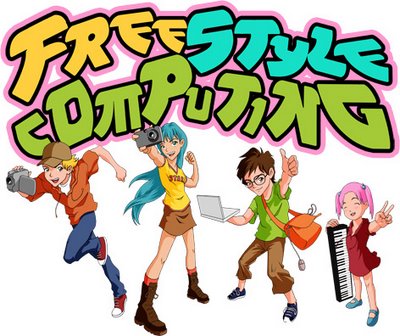
At Danfoss Universe, we just launched a pet project of mine, the freestyle computing competition – alas only in Denmark.
The competition is open for kids below 16. They can submit any creation that has computing involved in it – animation, websites, photoshop stuff, ring tones for phones, robots, whatever...
The jury will find the coolest production, emphasizing originality, technical skill, and the ability to combine several media.
We have two age brackets; up to 11, and 11-15 years. The winner in each bracket gets an i-pod – but every entrant recieves an evaluation from the jury.
The concept is heavily inspired by the u19 contest that is part of Prix Ars Electronica in Linz, Austria, and the Ars Electronica folks have been very helpful in discussing their experiences with us – they rock!
Our ambitions are to build this into a broadcast event, it seems obvious, considering the succes of the many current TV shows where young untried talents get a chance to show off.
For Danfoss Universe, it’s part of our mission to stimulate the interest and understanding of natural science and technology. We believe that encouraging selfexpression and communication through new uses of digital technology is as good a way to learn about technology as any.
We will post some of the works on our online gallery as we recieve them. I’m really looking forward to see what will come, I have a feeling it will be amazing.
Tuesday, August 01, 2006
A chilled experience

It’s a scorching summers’ day outside in Toronto, but I’m shivering in the airconditioning of the cinema where I’m finally watching Al Gore’s ”An inconvenient truth”.
They’ve done a great job in my opinion. Gore tells that he has given his climate presentation at least a thousand times, and a good part of the film shows him polishing and editing the show.
There’s a lot of pictures of Gore staring pensively out windows into the distance and, to me, some of the personal stuff gets a bit thick – but maybe that’s what you need in order to make it more compelling, and less like a lecture. Basically, if this movie can’t get the message across, I can’t imagine what will – apart from dire necessity, of course.
Still, it’s not exactly a blockbuster movie: I shared the cold theater with 4 others, but of course it’s been a couple of months since release by now.
So, now I’ve heard the podcast, read the book, seen the movie – It’s time to try to invite the man over to Denmark to spread the gospel.
Monday, July 31, 2006
The future according to the futurists
So, after 3 days of discussing the future at the futurists conference, what does the future look like? Well, not too inviting, I’m afraid.
I’ve been looking at the future for a couple of decades now, and I can’t recall that there has been such a sense of gloom concerning the coming years. You can go to session after session and people will be discussing global warming, epidemics, singularities leaving us in the dust, terrorism... You are incessantly confronted with exponential curves leading us to what looks like hell on earth – at accellerating speeds.
The only hopeful scenarios – those where continued technological progress manages to stave off the various problems of ressources, environmental degradation and health– all seem to take us into a very different existance as radically enhanced fusions of man and machine in societies with very different values. And that doesn’t look too tempting either.
Worse of all; all the well meaning solutions that people suggest; global governance, legislation and treaties, a new consiousness, various think tanks... it all sounds so totally inadequate, naive and somehow just plain boring. Maybe we can dampen things a bit by holding back, but frankly I doubt that you can get sufficient traction among the global masses of consumers and corporations.
I find that the things that do offer hope tend to be very concrete, practical action-based projects that prove that it’s possible to live a fullfilling life outside the logic that we seem to be stuck within. Often they are very local projects, but something like GEs Ecomagination efforts are inspiring too.
In conclusion: The shits seems to be hitting the fan for real – but, a lot of smart people have become acutely aware of this recently.
I’ve been looking at the future for a couple of decades now, and I can’t recall that there has been such a sense of gloom concerning the coming years. You can go to session after session and people will be discussing global warming, epidemics, singularities leaving us in the dust, terrorism... You are incessantly confronted with exponential curves leading us to what looks like hell on earth – at accellerating speeds.
The only hopeful scenarios – those where continued technological progress manages to stave off the various problems of ressources, environmental degradation and health– all seem to take us into a very different existance as radically enhanced fusions of man and machine in societies with very different values. And that doesn’t look too tempting either.
Worse of all; all the well meaning solutions that people suggest; global governance, legislation and treaties, a new consiousness, various think tanks... it all sounds so totally inadequate, naive and somehow just plain boring. Maybe we can dampen things a bit by holding back, but frankly I doubt that you can get sufficient traction among the global masses of consumers and corporations.
I find that the things that do offer hope tend to be very concrete, practical action-based projects that prove that it’s possible to live a fullfilling life outside the logic that we seem to be stuck within. Often they are very local projects, but something like GEs Ecomagination efforts are inspiring too.
In conclusion: The shits seems to be hitting the fan for real – but, a lot of smart people have become acutely aware of this recently.
Saturday, July 29, 2006
TV crap
Sorry to drone on about energy, but:
Just happened to see this ridiculous TV ad for the Hummer.

It starts out with a healthy, green-clad young man in a supermarket checkout, buying tofu and other deplorably bland, veggie stuff.

Right after him comes another guy who gets loads of meat, a bottle of alcohol and other tempting goodies. Our young green protagonist grows VERY frustrated.
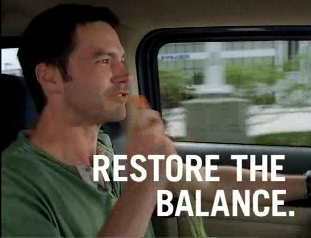
So he runs out and buys himself a hummer. Yeah! So finally he can eat a carrot with a smile. The caption reads: Restore the balance.

And of course it all ends with the Hummer logo over a shot of mother earth seen from space.
Wow! I guess I should start saving up for one too.
Just happened to see this ridiculous TV ad for the Hummer.

It starts out with a healthy, green-clad young man in a supermarket checkout, buying tofu and other deplorably bland, veggie stuff.

Right after him comes another guy who gets loads of meat, a bottle of alcohol and other tempting goodies. Our young green protagonist grows VERY frustrated.

So he runs out and buys himself a hummer. Yeah! So finally he can eat a carrot with a smile. The caption reads: Restore the balance.

And of course it all ends with the Hummer logo over a shot of mother earth seen from space.
Wow! I guess I should start saving up for one too.
Sleepless in Toronto

5 AM saturday morning, the view from my window is a wall of offices, almost half of them have the lights left on for the night – and in this case, the entire weekend. No sign of anyone working in any of those many rooms.
Canada seems as determined to waste energy as anyone else. At least, you can take comfort in the realization that there are plenty of easy ways to reduce the energy-load considerably. Just turn the light off when you leave.
The future is un-predictable
I’m at the world future society’s annual meeting – this year in Toronto. And boy, does the future ever look un-predictable. Seems we’re going in many different, mutually exclusive, directions at once.
Just to name a few: Turning back the burning of fossil fuels to anything near sustainable levels looks rather unfeasible on a 30 – 50 year timescale – So, we’re cooking the planet, with a lot of ensuing suffering in all kinds of ways.
Or: Will nano and bio-tech combined instead lift us out of the mess, make us capable of creating anything we like at low cost, solve the energy crisis, make everything recyclable, and change us into a new species of super-smart cyborgs in the process – in pretty much those same 30 – 50 years. Or less.
Just to name a few: Turning back the burning of fossil fuels to anything near sustainable levels looks rather unfeasible on a 30 – 50 year timescale – So, we’re cooking the planet, with a lot of ensuing suffering in all kinds of ways.
Or: Will nano and bio-tech combined instead lift us out of the mess, make us capable of creating anything we like at low cost, solve the energy crisis, make everything recyclable, and change us into a new species of super-smart cyborgs in the process – in pretty much those same 30 – 50 years. Or less.
Wednesday, July 12, 2006
Major mindless damage
The Herald tribune has this amazing article about how wasteful the Russian energy production and distribution is.
In the article the director of the International Energy Agency, Claude Mandil, specifically critizes the widespread practice of gas flaring - that is, burning off gas at oil wells.
"Between 40 billion cubic meters and 60 billion cubic meters a year are being burned in Russia," he said. "That is about a quarter of the 200 billion cubic meters of gas Russia exports to Europe a year."
According to the World Bank, each year about 150 billion cubic meters of natural gas is flared off - equivalent to 30 percent of the European Union's gas consumption.
Developing countries account for more than 85 percent of gas flaring and venting, including Nigeria, Russia, Iran, Iraq, Angola and Qatar.
In Russia, "gas flaring exists because today Gazprom is the only one that can buy this gas," Mandil said. "It buys this gas at such a low price that producers do not see the reason to build a small pipeline that could bring this gas from the field to the trunk line."
So much for avoiding the greenhouse effect...
In the article the director of the International Energy Agency, Claude Mandil, specifically critizes the widespread practice of gas flaring - that is, burning off gas at oil wells.
"Between 40 billion cubic meters and 60 billion cubic meters a year are being burned in Russia," he said. "That is about a quarter of the 200 billion cubic meters of gas Russia exports to Europe a year."
According to the World Bank, each year about 150 billion cubic meters of natural gas is flared off - equivalent to 30 percent of the European Union's gas consumption.
Developing countries account for more than 85 percent of gas flaring and venting, including Nigeria, Russia, Iran, Iraq, Angola and Qatar.
In Russia, "gas flaring exists because today Gazprom is the only one that can buy this gas," Mandil said. "It buys this gas at such a low price that producers do not see the reason to build a small pipeline that could bring this gas from the field to the trunk line."
So much for avoiding the greenhouse effect...
Friday, June 09, 2006
Snapshots from the future

I have a new book out!
It’s called Snapshots from the future, and it’s 7 short stories that describe life in about 25 years time – give or take a decade.
The book is published in Danish, but the text has been translated into English and the whole thing is posted at the website of Danfoss Universe.
For years I’ve wanted to create something like a cartoon, with a heavy emphasis on pictures and a narrative form to engage readers more emotionally. I’ve tried to keep light and inviting – but the underlying facts are never the less a quite serious attempt to destill years of future studies into a coherent picture.
It can be read by kids at about 15 years, but it’s not meant to be just for school. I would hope that anyone trying to make sense of the future could find some inspiration in it.
For me, the book has turned out pretty much exactly how I wished it – which is very satisfying, of course. The project has been a lot of fun. My old friend and colleague Henrik Føhns made it happen by agreeing to print the articles in the Danish magazine Samvirke – and by suggesting the book project in the first place (tak for det, Føhns!). Emil Landgreen has created some great and beautiful illustrations and fake advertisements.
So have a look – and let me know what you think.
Oh, and for Danes who want to buy the printed version:
FDBs Skolekontakt sells them, either 59 kr. for a copy or 350 kr. for a set of 30 copies.
Tuesday, May 23, 2006
Go ahead, emit!
Wow, this is seriously weird. Some organisation called "Competetive enterprise Institute" (sponsored by Exxon-mobil among others) has produced two very slick TV-ads that promote CO2. We call it life, they say. Check 'em out, you need to see this.
Monday, May 22, 2006
GE Ecomagination publishes first annual report

GE has just published a report/36 page advertising that describes the first year of their Ecomagination initiativ. It’s not perfect, some may think it’s mostly greenwash, but I happen to be impressed. It’s a very big company and taking it through this kind of re-orientation can not be easy. It’s an audacious undertaking, and it has real impact. Respect!
From the report:
Specifically, GE has pledged to:
Double its investment in clean R&D—GE is growing
its research in cleaner technologies from $700 million
in 2005 to $1.5 billion in 2010.
Increase revenues from ecomagination products—
GE will grow revenues from products and services that
provide significant and measurable environmental performance
advantages to customers—to at least $20 billion
in 2010, with more aggressive targets thereafter.
Reduce its greenhouse gas (GHG) emissions and improve
the energy efficiency of its operations—GE is committed to
reduce its GHG emissions 1% by 2012, reduce the intensity
of its GHG emissions 30% by 2008, and improve energy
efficiency 30% by the end of 2012 (all compared to 2004.)
Without this action, GHG emissions were predicted to rise
substantially by 2012, based on GE’s projected growth.
Keep the public informed—This report is just one way GE
will publicly report its progress in meeting these goals.
What’s so inconvenient about climate change?
Attempting to reduce climate change demands us to change our lifestyle at a very basic level. In one sense it represents a reversal of a development that has been a main characteristic of humanity.
The story of human development is intimately linked to our increasing power and freedom to connect and move around over ever larger distances.
With the technology that is likely to be available in the foreseeable future, avoiding climate change by reducing CO2 emissions, will require us to reverse that. So: Less jetting and driving around, less long distance trade, less freedom to choose whatever we want anywhere and anytime.
There are a lot of very good reasons to wish that we can continue towards higher connectivity, a cosmopolitan society, more comfort. It’s a big part of desires of modern man and woman: this slick world where humans get what we want - now.
Giving it up is not only inconvenient - somehow it feels like crawling backwards in the evolutionary tree.
The story of human development is intimately linked to our increasing power and freedom to connect and move around over ever larger distances.
With the technology that is likely to be available in the foreseeable future, avoiding climate change by reducing CO2 emissions, will require us to reverse that. So: Less jetting and driving around, less long distance trade, less freedom to choose whatever we want anywhere and anytime.
There are a lot of very good reasons to wish that we can continue towards higher connectivity, a cosmopolitan society, more comfort. It’s a big part of desires of modern man and woman: this slick world where humans get what we want - now.
Giving it up is not only inconvenient - somehow it feels like crawling backwards in the evolutionary tree.
Saturday, May 20, 2006
SAS Airlines offers emission calculator

You can't really say you don't know. SAS has created a web-service so passengers can see the emissions that the flight they are booking will cause.
Great idea, although it's very well hidden if you are accessing their website from the frontpage. I only found it because I had been given the direct link.
Al Gore on global warming
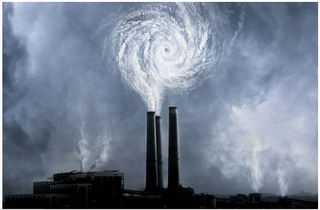
The trailer for "The incovenient truth", a new film with Al Gore presenting the scary low-down on climate change is out, as well as an extensive website with scientific facts, a calculator to see just how much damage you're doing, and the inevitable blog.
Judging from the trailer, it looks like a very powerful piece of argumentation - the Hollywood drama and bombastic music is not quite to my liking, but I have a sense that this might be what it takes to really get the message out.
It's a terrible situation we're facing - but at last it looks like the issue will emerge from denial. Next step is some action, but, uh, that's the hard part. Very inconvenient, indeed.
Monday, May 15, 2006
Heatwave in dense environment
Saturday, May 13, 2006
What kind of package would you like for your milk?

The Danish organic dairy producer Thise Mælk is currently using their milk cartons to ask consumers whether they would like a screw top on the milk cartons in the future. Very nice touch. I have no doubt that it provides genuinely useful information for Thise - while at the same time I, as a consumer, get a sense that they actually care and try to produce in a way that I prefer.
You vote by going to their website, of course. I voted no.
Tuesday, May 02, 2006
Elements of the web 2.0-sphere
In his speech at Emerging tech 06 (blogged below) Bruce Sterling gives a good wrap up of some of the elements of the web 2.0-sphere (at about 34 minutes into the speech):
- Un-intended use
- user contribution
- effortless scaleability
- radical decentralization
- costumer self service
- mass service of micromarkets
- software as a service
- right to remix
- architected participation
- Un-intended use
- user contribution
- effortless scaleability
- radical decentralization
- costumer self service
- mass service of micromarkets
- software as a service
- right to remix
- architected participation
Spimes?
IT-conversation just posted a good speech by Bruce Sterling, recorded at Emerging Tech 2006. The title is ”The internet of things”. As usual Sterling is deeper than he appears to be.
In his speech Sterling outlines 6 qualities of a future ”internet of things”:
1. With interactive chips, objects can be labelled with unique identeties, electronically bar-coded, using RFID, a tag that you can mark, rank, sort and shuffle.
2. With local and precise positioning systems, geolocative systems which work out where you are and where things are.
3. With powerful search engines, autogoogling objects.
4. With cradle to cradle recycling, sustainability, transparent production, sorting and shuffling of garbage
5. 3d virtual models of things, virtual design, cad and cam, having objects present as virtualities in the network before they become physical objects 6. Rapid prototyping of objects, fabjects, the ability to digitally manufacture real world things directly or almost directly from their virtual plans
And Sterling proceeds:
Now, if objects in the future had these 6 qualities people would interact with objects in an un-precedented way. It will be so strange and different that we could think about it better if this class of objects had its own name. So I call an object like that a ”spime”. Because an object like that is traceable in space and time
Spimes are manufactured objects whose informational support is so extensive and rich that they are regarded as material instantiations of an immaterial system. Spimes begin and end as data, they are virtual objects first and actual objects second.
So we can engage with these objects better during their entire life cycle. From their moment of invention to their decay.
Sterling also adds that spimes are things which are plannable, trackable, findable, recyclable, uniquely identified and that generate histories.
End of quote.
Personally, I don’t like the word ”spime”, if just for the tone of it. But I’m not sure either that this particular definition is the best way to encircle and categorize a set of developments that I DO believe is significant, and which Sterling summarizes brilliantly.
A illuminating excercise is to try imagine what the objects of the industry you happen to be in would be like, if fitted with those 6 qualities. Very different!
In his speech Sterling outlines 6 qualities of a future ”internet of things”:
1. With interactive chips, objects can be labelled with unique identeties, electronically bar-coded, using RFID, a tag that you can mark, rank, sort and shuffle.
2. With local and precise positioning systems, geolocative systems which work out where you are and where things are.
3. With powerful search engines, autogoogling objects.
4. With cradle to cradle recycling, sustainability, transparent production, sorting and shuffling of garbage
5. 3d virtual models of things, virtual design, cad and cam, having objects present as virtualities in the network before they become physical objects 6. Rapid prototyping of objects, fabjects, the ability to digitally manufacture real world things directly or almost directly from their virtual plans
And Sterling proceeds:
Now, if objects in the future had these 6 qualities people would interact with objects in an un-precedented way. It will be so strange and different that we could think about it better if this class of objects had its own name. So I call an object like that a ”spime”. Because an object like that is traceable in space and time
Spimes are manufactured objects whose informational support is so extensive and rich that they are regarded as material instantiations of an immaterial system. Spimes begin and end as data, they are virtual objects first and actual objects second.
So we can engage with these objects better during their entire life cycle. From their moment of invention to their decay.
Sterling also adds that spimes are things which are plannable, trackable, findable, recyclable, uniquely identified and that generate histories.
End of quote.
Personally, I don’t like the word ”spime”, if just for the tone of it. But I’m not sure either that this particular definition is the best way to encircle and categorize a set of developments that I DO believe is significant, and which Sterling summarizes brilliantly.
A illuminating excercise is to try imagine what the objects of the industry you happen to be in would be like, if fitted with those 6 qualities. Very different!
Singularity summit at Stanford
Uh, I wish I could go to the singularity summit at Stanford may 13th. Looks like it will be a mind blowing day. It's even free - if you're in the neighborhood, of course. One can only hope that they podcast it.
The website has lots of good stuff and references for anyone who's interested in the singularity discussion
The website has lots of good stuff and references for anyone who's interested in the singularity discussion
Wednesday, April 26, 2006
The poetry of everyday life
Tuesday, April 25, 2006
A two-way argument for in-equality
An annual survey of Danish business paper Børsen shows that, once again, executive pay has risen many times faster than salaries for the rest of us. Some expert explained on the radio that the increasing gap in income is justified because of the increasing globalization. If we want to attract and keep the talent, Danish executives should be compensated at the level they could achieve outside of this egalitarian little place.
Interestingly, more or less the same argument is used to justify keeping salaries low for the non-executive workforce; increasing globalization means that workers from Denmark are in direct competition with workers in countries with much lower wages and benefits.
Both arguments are probably right. But it does make me a bit uneasy looking at a world with an increasing gap between the have-nots and the have-a-whole-lot.
Interestingly, more or less the same argument is used to justify keeping salaries low for the non-executive workforce; increasing globalization means that workers from Denmark are in direct competition with workers in countries with much lower wages and benefits.
Both arguments are probably right. But it does make me a bit uneasy looking at a world with an increasing gap between the have-nots and the have-a-whole-lot.
Thursday, April 20, 2006
What makes information valuable
Traditionally, information in media has had value by virtue (among other factors) of being news, being true, relevant and objective.
Increasingly, a number of additional factors determine the value of an item in the media. So here’s a list I’m working on:
For information to be valueable and useful it should be:
-Modular. Easy to break up into smaller nuggets.
-Easy to pass on and recombine
-In a standardized format
-Open code – with permission and the possibility to remix
-Receptive to tags and meta data
-With a community around it
Obviously, this suggests that journalists must learn to rethink the way they format what they produce.
Increasingly, a number of additional factors determine the value of an item in the media. So here’s a list I’m working on:
For information to be valueable and useful it should be:
-Modular. Easy to break up into smaller nuggets.
-Easy to pass on and recombine
-In a standardized format
-Open code – with permission and the possibility to remix
-Receptive to tags and meta data
-With a community around it
Obviously, this suggests that journalists must learn to rethink the way they format what they produce.
Wednesday, April 12, 2006
Schizophrenic times
It seems there are at least a couple of full size realities out there – somehow racing towards each other at accellerating speeds.
One of them is the comfort in which I’m writing this. My home, my great computer, a cup of fresh tea, the cozy comfort, wealth and safety that I can marvel at in gratitude.
Some of the other realities are quite familiar but at an entirely abstract level – for instance the madness and sadness of the Mid-east, the climate change, the usual list...
But frankly, I have no practical interactions with the issue, it’s all media.
Personally, I’ve never been richer, I’ve never had so many possibilities, I’ve never been more comfortable. It's a time of progress – and I have a sense that I share this with many others.
And yet, so much of the media horizont tells me the world is going to hell – and it may very well be the case.
So, I’m sitting here as a spectator, just watching. Wondering when I will be entangled – for real – in those other realities. What will it be like?
One of them is the comfort in which I’m writing this. My home, my great computer, a cup of fresh tea, the cozy comfort, wealth and safety that I can marvel at in gratitude.
Some of the other realities are quite familiar but at an entirely abstract level – for instance the madness and sadness of the Mid-east, the climate change, the usual list...
But frankly, I have no practical interactions with the issue, it’s all media.
Personally, I’ve never been richer, I’ve never had so many possibilities, I’ve never been more comfortable. It's a time of progress – and I have a sense that I share this with many others.
And yet, so much of the media horizont tells me the world is going to hell – and it may very well be the case.
So, I’m sitting here as a spectator, just watching. Wondering when I will be entangled – for real – in those other realities. What will it be like?
Tuesday, April 04, 2006
Sony drops robo-pets

For some reason this has slipped under my radar till now, but:
Sony has decided to discontinue their robotic efforts, which means that they no longer will produce Aibo and they will stop developing their humanoid luxury robot Qrio.
You can see the announcement here.
I must say I was pretty impressed with Aibo and Qrio. Watching them move around you get this strange feeling that there is something in there - a third kind of being; not just mechanical, not quite alive.
I never felt tempted to actually get one, I wouldn't know what to do with it. On the other hand, I'm surprised that Sony is pulling out. Whether it will be as robo-pet, security robots or whatever, I still believe robotics will be a growing market.
Monday, February 20, 2006
Better late than never - google earth for mac

This is hardly news, but it had escaped my till now. Google earth is now available for mac! Uhhh, it's so cool. Get it here.
Now, would somebody please make a better resolution shot of my home.
Thursday, February 16, 2006
From transaction to interaction
I noticed this little nugget of wisdom in a podcast from Davos with Cisco CEO John Chambers: He says we're moving from transaction to interaction.
It's the old "markets are conversations" riff - and increasingly true.
It's the old "markets are conversations" riff - and increasingly true.
Friday, February 10, 2006
Mobility madness
Saturday, January 28, 2006
Good food in the big apple
Two good restaurants that I have tried several times over the years with great delight. High quality, personality, reasonable prices, lots of people:
For Sushi:
Hasaki, 210 east 9th. st.
Right by skt. Marks square
For Mexican:
La Palapa Rockola, 359 sixth ave.
Between Washington place and west 4th. st.
For Sushi:
Hasaki, 210 east 9th. st.
Right by skt. Marks square
For Mexican:
La Palapa Rockola, 359 sixth ave.
Between Washington place and west 4th. st.
Friday, January 27, 2006
Thursday, January 26, 2006
Democratic dilemma
So, now that Hamas has been voted into power in Palestine, president Bush faces the same dilemma that many of us feel about him: We believe in democracy, but we sometimes feel extremely uncomfortable with those that get elected.
Podcasts. from Davos

Just in case you can't get your helicopter started to go in person, most of the sessions are being podcast - here's the menu to choose from.
Saturday, January 21, 2006
What makes information valuable?
A few more thoughts on Apple I-life 06.
To me it’s significant because it brings us further ina development that is changing the media and the ways in which we use it. The tools we use for the most part to produce media where developed according to a paradigm where information was mainly something you created and transmitted – or you recieved and consumed it. It was a step by step process, mostly one way.
But a tool like I-life 06 reflects and promotes a differenct paradigm. It takes it for granted and it encourages you to use media in a new way.
You know:
Where Information is created and exchanged as a conversation with a potentially very large network of participants – rather than producers and consumers.
Where each information unit is treated as a component that can be reused, changed, combined with other units, tagged, commented, linked.
So, information is flow, information is under development, information is participatory.
As our tools are changed to fit this paradigm, I think we will start to think differently about what makes information valuable. New qualities will become important, such as:
- open code
- easy to pass on and recombine
- standardized format
- receptive to tags and meta data
- with a community around it
And, it seems that very similar considerations will apply to every business and realm where digital technology is a dominant part of the value creation.
To me it’s significant because it brings us further ina development that is changing the media and the ways in which we use it. The tools we use for the most part to produce media where developed according to a paradigm where information was mainly something you created and transmitted – or you recieved and consumed it. It was a step by step process, mostly one way.
But a tool like I-life 06 reflects and promotes a differenct paradigm. It takes it for granted and it encourages you to use media in a new way.
You know:
Where Information is created and exchanged as a conversation with a potentially very large network of participants – rather than producers and consumers.
Where each information unit is treated as a component that can be reused, changed, combined with other units, tagged, commented, linked.
So, information is flow, information is under development, information is participatory.
As our tools are changed to fit this paradigm, I think we will start to think differently about what makes information valuable. New qualities will become important, such as:
- open code
- easy to pass on and recombine
- standardized format
- receptive to tags and meta data
- with a community around it
And, it seems that very similar considerations will apply to every business and realm where digital technology is a dominant part of the value creation.
Meme watching
Friday, January 13, 2006
The means to build and access the global brain
No, it’s not just a fancy metaphore. We are building a global brain, connecting the neurons by our collective efforts to put knowledge online, connecting sensors to the net, tagging, aggregating, commenting, linking, concluding...
We’ve been at it for a long time. Maybe it started with the passing of knowledge and stories between generations, it gained speed with the ability to draw and write to store and transmit information, - and you the rest: Things are accellerating, with more connections, better tools.
And it’s real. Real knowledge, real inventions, valuable insights emerge as people connect the dots and exchange information.
It’s almost banal, but we are collectively enhancing our cognitive abilties through our increasing participation in this emerging global organism.
Much has been said about using genetics and nanotech to enhance humans, but in fact we’re doing it all the time. Our cognitive and sensory abilities are very directly related to the degree to which we use information technology. And we’ve long since passed the point where we could do without it.
We’ve been at it for a long time. Maybe it started with the passing of knowledge and stories between generations, it gained speed with the ability to draw and write to store and transmit information, - and you the rest: Things are accellerating, with more connections, better tools.
And it’s real. Real knowledge, real inventions, valuable insights emerge as people connect the dots and exchange information.
It’s almost banal, but we are collectively enhancing our cognitive abilties through our increasing participation in this emerging global organism.
Much has been said about using genetics and nanotech to enhance humans, but in fact we’re doing it all the time. Our cognitive and sensory abilities are very directly related to the degree to which we use information technology. And we’ve long since passed the point where we could do without it.
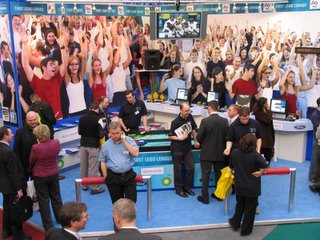
The BETT show, supposedly the worlds largest show on IT and education. I can testify; it IS big. The usual tradeshow madness, this one takes place at Londons olympia hall.
It’s a weird experience: it’s the place where all the teachers that are computer literate and really try to push the envelope, and it’s completely packed with companies that develop educational solutions that use computers in all kinds of clever ways. So it’s like, computers are a natural tool in classrooms, and kids can benefit tremendously from using their laptops, mobile phones, blogs, game consols etc. as an integrated part of learning.
And yes, I totally believe in that. But the BETT show is like a parallel reality. We all get it here. But if you look at the reality of the school that my kids attend it’s a very different story – a story where classrooms and the way kids learn is pretty much the same as when I was a child - way back in the industral society.
A few findings:
- Smartboard, the leading manufacturer of .. well, smart boards, told that they have sold 375.000 boards worldwide so far – 125.000 of those in the UK.
But first of all, Apple was showing i-life 06. To me it’s a work of genius. It’s a pleasure to sense the intellect behind it. The integration of podcasting/RSS subscription and the continued seamless and totally, wonderfully easy integration of all media... it’s exactly what we’ve hoped for, but haven’t quite seen.
A lot has been written about the transition to Intel processors, and, yes, it adds speed and probably decreases incompatability, but to me the really significant part is the vision of the new i-life. It takes Apple to a new level, way ahead of the pack.
More on this later. Gotta get some sleep.
Thursday, January 12, 2006
LSE - gotta go
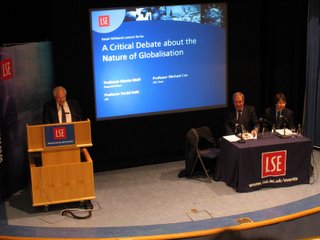
When in London I always check out the events program at LSE, the London School of Economics. Some of the talks there are amazing, the most powerful people and the best minds of the planet presenting in a civilized academic atmosphere in the delightfully old-fashioned Hong Kong Theatre. Tonight it was Martin Wolf, editor and commentator at Financial Times, and LSEs own David Held discussing the consequences of globalization.
Wolf, the liberalist, argued that markets will determine pretty much everything.
Held, describing himself as a ”cosmopolitan social democrat, argued that we still need ideology. He feels that we can influence where the world is heading by insisting on certain universal values, such as human rights, social justice and environmental protection.
I’m on David Helds side.
Let me highlight two upcoming LSE events:
On february 15th Ulrich Beck will speak on ”Living in the world risk society”, and on march 16th. Richard Dawkins, Dan Dennett and Matt Ridley will discuss Dawkins book ”the selfish gene” on the 30th anniversary of its publishing.
... And there’s so much more. All free, I should add. A treat!
Monday, January 09, 2006
Sunday, January 08, 2006
Ugly dog
Tuesday, January 03, 2006
Energy too cheap to meter
I’ve been reading up on energy policy lately – it’s important stuff. One piece that really sticks out is Peter Schwartz’ glowing presentation of ”How clean, green atomic energy can stop global warming” in Wired Magazine some months back.
There’s something very attractive about the spirit of optimism and the drive towards a bigger, better future that Peter Schwartz and GBN a
argues so compellingly for in his papers – like the ”Long boom” vision back in the pre-dot.com crash days.
There’s a very important component in Schwartz’ article: it offers a vision that you want to believe in and pursue. Try to read the final paragraph of his article:
” The more seriously you take the idea of global warming, the more seriously you have to take nuclear power. Clean coal, solar-powered roof tiles, wind farms in North Dakota - they're all pie in the emissions-free sky. Sure, give them a shot. But zero-carbon reactors are here and now. We know we can build them. Their price tag is no mystery. They fit into the existing electric grid without a hitch. Flannel-shirted environmentalists who fight these realities run the risk of ending up with as much soot on their hands as the slickest coal-mining CEO.
America's voracious energy appetite doesn't have to be a bug - it can be a feature. Shanghai, Seoul, and São Paolo are more likely to look to Los Angeles or Houston as a model than to some solar-powered idyll. […]
Nuclear energy is the big bang still reverberating. It's the power to light a city in a lump the size of a soda can. Peter Huber and Mark Mills have written an iconoclastic new book on energy, The Bottomless Well. They see nuclear power as merely the latest in a series of technologies that will gradually eliminate our need to carve up huge swaths of the planet. "Energy isn't the problem. Energy is the solution," they write. "Energy begets more energy. The more of it we capture and put to use, the more readily we will capture still more."
Wouldn’t it be wonderful! The way I read it, these sentences argue that energy consumption is at the heart of our civilization. The more energy we consume, the more powerful, comfortable and generally highly developed we become. We should harness and use energy freely, apply it in abundance to amplify our power and continued progress from primitive being to some yet unknown ever-evolving superior state of humanity.
We’re just not going to get off the ground unless we exploit the ressources around us.
In a way I agree. We’ve gotta move forward, and I enjoy a nice warm house, jet travel and global consumer choices as much as anyone. Energy is the key to all of this.
Here’s another quote:
”Wouldn't it be a blast to barrel down the freeway in a hydrogen Hummer with a clean conscience as your copilot? Or not to feel like a planet killer every time you flick on the A/C? That's how the future could be, if only we would get over our fear of the nuclear bogeyman and forge ahead - for real this time - into the atomic age.
If only our energy consumption didn’t wreck the biosphere. If only nuclear energy really were as un-problematic as Peter Schwartz argues that it is.
My fear is that there ARE serious hidden costs – and not just in terms of pollution and security, but more fundamentally with the materially focused, get-ahead-culture that his words project.
It’s great to make a splash and deem it progress, but if it leaves everybody else worse off, and in fact corrodes our common basis of existence, maybe it would be better to focus less on transcending the human condition and fullfiling consumer fantasies – and concentrate more on simply keeping our civilization going through what could be a very severe situation.
You can’t save your way to grandeur. Maybe we need to ”forge ahead into the atomic age” in order not to be swamped by the problems we have created on our way to here. But then again, maybe there’s a more nuanced way of proceeding: acknowledging that there’s more to life than barreling down the freeways; some values that are not as dependent on massive injections of energy.
Yes, I’m split, confused, scared and tempted.
... a final comment: To some extent we all have our opinions shaped by who’s paying the bill. Reading his articles in Wired magazine one should be aware that this is not written a journalist. I can’t help wonder who Peter Schwartz’ clients are – a little disclosure would make it easier to asses the paper.
There’s something very attractive about the spirit of optimism and the drive towards a bigger, better future that Peter Schwartz and GBN a
argues so compellingly for in his papers – like the ”Long boom” vision back in the pre-dot.com crash days.
There’s a very important component in Schwartz’ article: it offers a vision that you want to believe in and pursue. Try to read the final paragraph of his article:
” The more seriously you take the idea of global warming, the more seriously you have to take nuclear power. Clean coal, solar-powered roof tiles, wind farms in North Dakota - they're all pie in the emissions-free sky. Sure, give them a shot. But zero-carbon reactors are here and now. We know we can build them. Their price tag is no mystery. They fit into the existing electric grid without a hitch. Flannel-shirted environmentalists who fight these realities run the risk of ending up with as much soot on their hands as the slickest coal-mining CEO.
America's voracious energy appetite doesn't have to be a bug - it can be a feature. Shanghai, Seoul, and São Paolo are more likely to look to Los Angeles or Houston as a model than to some solar-powered idyll. […]
Nuclear energy is the big bang still reverberating. It's the power to light a city in a lump the size of a soda can. Peter Huber and Mark Mills have written an iconoclastic new book on energy, The Bottomless Well. They see nuclear power as merely the latest in a series of technologies that will gradually eliminate our need to carve up huge swaths of the planet. "Energy isn't the problem. Energy is the solution," they write. "Energy begets more energy. The more of it we capture and put to use, the more readily we will capture still more."
Wouldn’t it be wonderful! The way I read it, these sentences argue that energy consumption is at the heart of our civilization. The more energy we consume, the more powerful, comfortable and generally highly developed we become. We should harness and use energy freely, apply it in abundance to amplify our power and continued progress from primitive being to some yet unknown ever-evolving superior state of humanity.
We’re just not going to get off the ground unless we exploit the ressources around us.
In a way I agree. We’ve gotta move forward, and I enjoy a nice warm house, jet travel and global consumer choices as much as anyone. Energy is the key to all of this.
Here’s another quote:
”Wouldn't it be a blast to barrel down the freeway in a hydrogen Hummer with a clean conscience as your copilot? Or not to feel like a planet killer every time you flick on the A/C? That's how the future could be, if only we would get over our fear of the nuclear bogeyman and forge ahead - for real this time - into the atomic age.
If only our energy consumption didn’t wreck the biosphere. If only nuclear energy really were as un-problematic as Peter Schwartz argues that it is.
My fear is that there ARE serious hidden costs – and not just in terms of pollution and security, but more fundamentally with the materially focused, get-ahead-culture that his words project.
It’s great to make a splash and deem it progress, but if it leaves everybody else worse off, and in fact corrodes our common basis of existence, maybe it would be better to focus less on transcending the human condition and fullfiling consumer fantasies – and concentrate more on simply keeping our civilization going through what could be a very severe situation.
You can’t save your way to grandeur. Maybe we need to ”forge ahead into the atomic age” in order not to be swamped by the problems we have created on our way to here. But then again, maybe there’s a more nuanced way of proceeding: acknowledging that there’s more to life than barreling down the freeways; some values that are not as dependent on massive injections of energy.
Yes, I’m split, confused, scared and tempted.
... a final comment: To some extent we all have our opinions shaped by who’s paying the bill. Reading his articles in Wired magazine one should be aware that this is not written a journalist. I can’t help wonder who Peter Schwartz’ clients are – a little disclosure would make it easier to asses the paper.
Subscribe to:
Comments (Atom)












